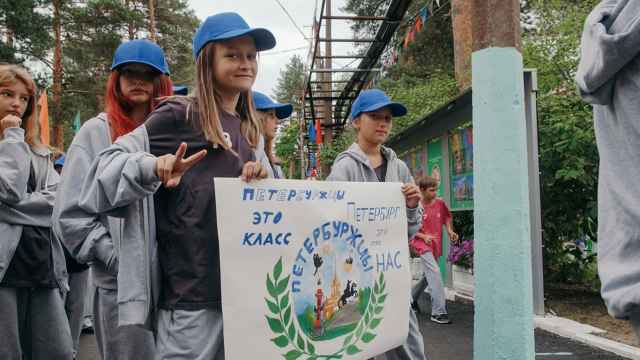The governor of Tula was questioned by the Federal Security Service over an alleged link to a graft case, which may be the latest step in President Dmitry Medvedev's pre-election crackdown on local leaders.
No charges have been filed against Vyacheslav Dudka, 50, but he is already in danger of sacking and expulsion from the ruling United Russia party, reports said.
The FSB questioned Dudka after regional official Viktor Volkov, charged with accepting a bribe of 40 million rubles ($1.4 million), said the money was intended for the governor.
Investigators claim Volkov, who heads the region's department for property and land relations, received the bribe from a company that sought to obtain a land plot to construct a shopping mall.
Volkov acquired the money in November but was detained only in January, Kommersant said.
The department head never passed the money to the governor despite meeting him several times after accepting the cash, an unidentified source close to Dudka told the daily, without elaborating.
Dudka was questioned twice, last Saturday and Monday, but only as a witness, not a suspect, Kommersant said.
Meanwhile, the Kremlin was rumored to be drafting a sacking order for Dudka. A source in the presidential office told The Moscow Post for a story published Thursday that the Tula head faces removal over "loss of confidence."
United Russia said in a statement late Wednesday that it may purge Dudka from its ranks if law enforcement agencies prove any wrongdoing on his part.
Spokespeople for the Investigative Committee and the Tula governor refused to comment to The Moscow Times on Thursday. A Kremlin spokesman was not available for comment.
But Dudka's press office said in a statement that the accusations are actually a counterattack from local officials whom the governor has targeted in his own anti-corruption campaign.
The vaguely worded statement did not explicitly identify the masterminds of the alleged smear campaign, calling them "destructive forces" leading an "information war" against the governor.
But the statement names a former head of the Tula city administration, Albert Ukolov, as well as "several deputy governors and department heads" among those whose sackings have contributed to the confrontation.
The Investigative Committee last year named Ukolov as a suspect in a case opened on charges of abuse of authority. Tula deputy governors Alexei Korablyov and Vladimir Savoshchenko were not reappointed last April, though it was not immediately clear whether they faced any criminal probes.
The head of the Tula region department for ecology and natural resources, Alexei Lazarev, was convicted of bribery last year, and the ex-chief of the health care department, Yevgeny Yudin, was identified by the committee as a suspect in a separate abuse of authority case, also in 2010.
Medvedev approved in February the resignations of Kamchatka Governor Alexei Kuzmitsky and Kabardino-Balkaria head Boris Ebzeyev. Both quit voluntarily, but reports said it is just a formality to mask the Kremlin's disapproval of their policies.
Last year a round of sackings by Medvedev caused the removal of many veteran governors, including Moscow's Yury Luzhkov.
Dudka's problems may be linked to an ongoing political crisis in his region, where the Tula city legislature, controlled by United Russia, fired Mayor Alisa Tolkachyova earlier this week — a move the governor has endorsed. Tolkachyova promised to sue.
A local edition of Moskovsky Komsomolets published last March also accused Dudka — in power since 2005 and reappointed by Medvedev in 2010 — of nepotism and failure to curb rising unemployment in the region.
Governors are rarely linked to corruption probes, but the practice is not unheard of. Former Oryol region governor Yegor Stroyev was questioned by investigators in 2009, and the heads of Volgograd and Arkhangelsk regions had to comment on separate corruption cases in 2007. None of the three were charged.
A Message from The Moscow Times:
Dear readers,
We are facing unprecedented challenges. Russia's Prosecutor General's Office has designated The Moscow Times as an "undesirable" organization, criminalizing our work and putting our staff at risk of prosecution. This follows our earlier unjust labeling as a "foreign agent."
These actions are direct attempts to silence independent journalism in Russia. The authorities claim our work "discredits the decisions of the Russian leadership." We see things differently: we strive to provide accurate, unbiased reporting on Russia.
We, the journalists of The Moscow Times, refuse to be silenced. But to continue our work, we need your help.
Your support, no matter how small, makes a world of difference. If you can, please support us monthly starting from just $2. It's quick to set up, and every contribution makes a significant impact.
By supporting The Moscow Times, you're defending open, independent journalism in the face of repression. Thank you for standing with us.
Remind me later.





